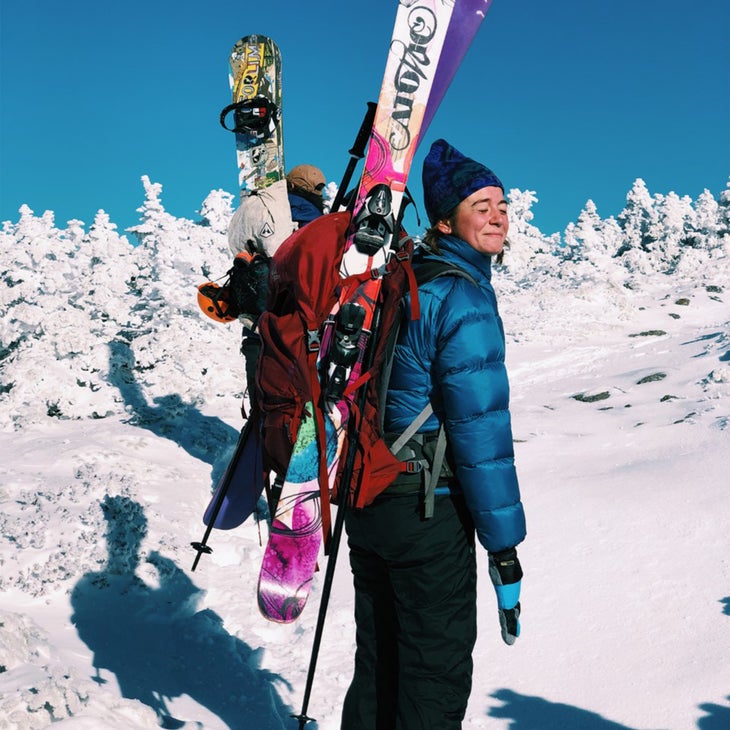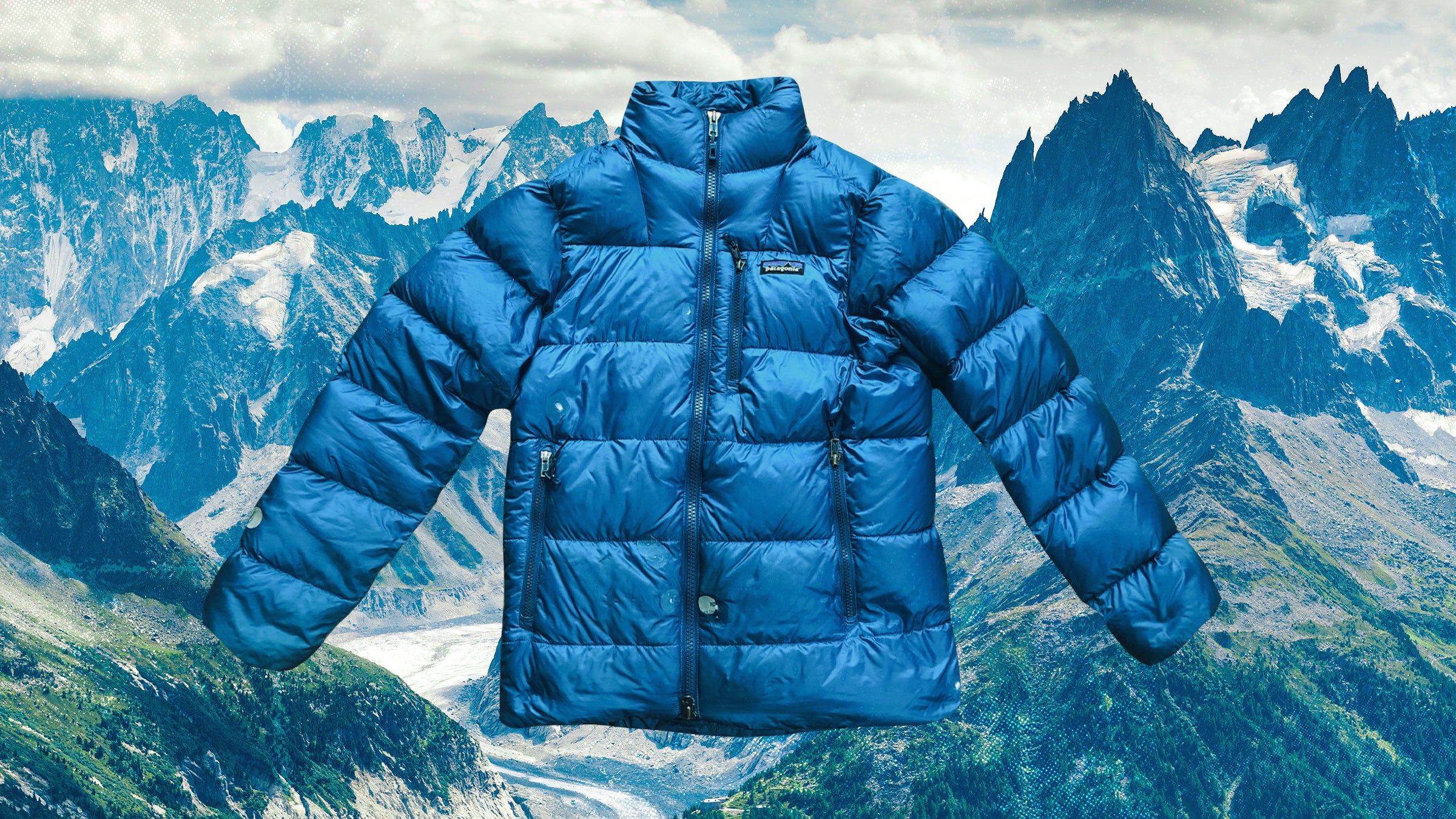For years I’ve had this coat that doesn’t fit right. It’s a siren-blue Patagonia Fitz Roy down puffy that I got on sale for $49. Enticed by the bargain, I forcefully overlooked the fact that the only size available, a men’s small, ballooned out in the midsection and barely zipped over my hips. It was the warmest thing they had, a winter belaying coat, and I knew I’d be lucky to find something that nice for five times as much. With a vague sense of unease, I congratulated myself on my stoic lack of vanity and bought the thing.
On its first foray into the field—a whitewater canoe trip with my college outing club—I looked like a blue marshmallow Peep with legs, my butt accentuated by the tightness of the hem and my middle puffing out in Michelin Man tubes of down. Even in November, with wet hair and a fogged-window sky promising snow, I was overheating. Early the next morning, I left my tent mates shivering in their sleeping bags, did some jumping jacks, and fried a dozen eggs in bacon grease. The others woke, reluctantly, to a cold breeze cutting through a haze of black smoke.
“Uh, Luna?” one boy pointed out, grinning, “your jacket’s full of holes.” I sighed and looked down at my overinflated stomach and sleeves. The shiny fabric was splattered with grease stains and liberally leaking fluff.
Over time, I learned to compensate for the jacket in much the same way I compensate for all my insecurities—by flaunting them until they appeared intentionally comic. I looked ridiculous in the thing, so I wore it all the time. I took to leaving the bottom few inches of the handy double zipper open to loosen the jacket. I patched the holes with a mix of duct tape and iron-ons. But the truth was I hated that jacket. It made me look like I didn’t take care of my stuff. It made me look fat. Worst of all, I was embarrassed to be embarrassed about the fancy Patagonia gear I’d gotten for a steal.
Today, with a couple hours to kill before the next ferry leaves for my family’s house on a not-so-remote Maine island, I take the jacket in for repair at the local Patagonia outlet. The woman behind the register has Midwestern charm.
“Girl, we’ve all had a rough year,” she says conspiratorially. ���’m just gonna get you a new coat.”
��� did get that one on sale,” I stammer, but she’s already heading to the back.
“Don’t worry about it,” she says loudly. “Everything’s on sale right now! It’s our practice to replace or repair anything that hasn’t stood up to normal wear and tear.”

Suddenly I feel like my dirtbag gear philosophy—that big companies are always trying to rip you off—has been turned on its head. The woman must have thought the holes in my jacket were the result of ordinary use, not an overzealous fry cook operating in the glow of a headlamp beam.
She comes back, lays a spiffy new jacket on the counter: Gore-Tex shell, powder skirt, 800-fill power. It’s a tasteful navy.
“This one retails for $799, but it’s been marked down twice, and it’s the only one with comparable warmth in a men’s small,” she says. “We have to give you the most similar to what you initially bought.”
“Are you sure? I mean, I know I should have worn a shell over a coat like that. Probably my fault it didn’t hold up better.” I trail off.
She’s already punching it into the system. “Don’t worry about it!”
So I walk out with an $800 jacket, only mildly nervous that I’m going to have a fatal accident on the way home as a result of my newly damaged karma. Impulsively, I zip it over my fleece, tags and all. It fits. I stuff my hands into downy pockets, turn a corner to reach my car, and catch sight of myself in a shop window. Stop. Stare at my reflection a moment in the glass. And then I’m hurrying back to the store, unzipping as I go, making sure the jacket is off before I come to the door.
“Excuse me, I’m so sorry to bother you, but could I please have my old coat back?” It comes out all in one breath. Then, quietly: ��� changed my mind.”
A different woman is at the register now, reserved and matter-of-fact. She pulls my old jacket out of a hamper and takes back the new one. I receive the blue puffy like I’ve been handed a baby or a very full mug of tea. I slide my arms into the sleeves a little wonderingly, a little apologetically. Zip the too-tight zipper. Then get the hell out of there.
After the pandemic began in early 2020, I went home from college for three months. My dad and I did our best to pretend that the nebulous quality of our days was a choice rather than an imposition. We stuck a New Yorker cartoon to the fridge that showed a man on the phone, telling whoever’s on the other end, ���’d love to, but I have a million lonely ritualistic things I need to do.” Friday night movies became a solace, a source of conversation, and a marker of the days.
By the time I was home again, the New Yorker clipping was browning around the edges from the sunbeams that came through our big kitchen windows, making it look like a neglected pancake. A summer had passed, and a fall living with friends and taking classes remotely. I found, as I often have since high school, that coming home after a long time away is an exercise in stuffing my new self back into the dimensions of my old one. Increasingly, I do not fit.
We continued the ritual of watching old movies together. My dad and I are both fiercely proud, insistent on proving that we know more than the other about various things that interest us. Any subject of overlap is a competition zone. Kayaking. Books. My aspirations to work in outdoor education. The movies gave us common ground that was impersonal, less fraught. We laughed and talked easily, the way it used to be, about lives not our own.
During Christmas break, on a comedy kick, we watched Diner, the 1980s classic about five friends in their twenties and the diner that provides the touchstone for their diverging lives. The impending marriage of one of the guys, Eddie Simmons, and his insistence that his fiancée pass a test about the Baltimore Colts before he’ll go through with it, drives the plot. Afterward, we stayed up talking.
I wondered why you never see the face of the bride. Everything but her voice and hands were omitted, and I’d assumed this was to show that her inclusion in Eddie’s life wasn’t certain yet. I’d been sure that the final scene, the wedding, would be a big reveal—the pretty bride, the happy groom, his doubts forgotten, the viewer’s sense that the camaraderie cherished since childhood had been forever changed. Instead, I was disappointed and confused.
As I ride home on the ferry from my unproductive trip to the outlet, something sticks. I’m standing outside on the deck to avoid fellow passengers, as I have no matter the weather since spring. There’s nobody to talk to, and flipping pages with mittened hands is impossible, so I’m watching the water again. Thinking about how my life rushes on like the waves churned to cream in our wake, changing too fast to fix my eye.
I’ve lost friends this year to distance, but I’ve also gained some through proximity. For months, five roommates formed the whole of my social life. Because they were all I had, I accepted them. I learned to swallow the bad and wash it down with the good. I came to love them not because of something in myself that drew me to them, but for exactly who they were. Like family.
I understand, suddenly, why we never get a glimpse of the bride. Because it matters very little what she looks like, even who she is. In the end, though she fails the football test, Eddie gives her the benefit of the doubt and marries her anyway. It’s his commitment to her, the imperfect bride, and his circle of friends’ grudging choice to accept her, that makes this ending a happy one.
In a few weeks I leave for Denmark, and my brother’s apartment, where I’ll complete another semester taking classes remotely. I’ll get a job for the summer. Then I’ll move in with friends for senior year. I’ve made it, not just to the promise of a vaccine but to the end of being stuck at home. And yet I hope I’m not too quick to exchange the months restricted by the pandemic for a newer model. I wanted the old coat back because, for a moment in a shop window without it, I didn’t recognize myself. That inconsequential exchange taught me that having something to make the best of can be better than having the best. While so much time at home has made me feel more acutely the ways I’m constricted by my dad’s love for me, the torn parts in our relationship, it’s also forced me to mend what I can and accept the rest.
When I pack, I stuff the coat in last. Not because it’s the only thing I’ve got, but because it’s the warmest thing I have. I also carry the memory of stepping off the ferry that day and hurrying up the hill toward home. How opening the door to our cluttered mudroom was like sliding my arms into an old jacket, familiar and worn.


